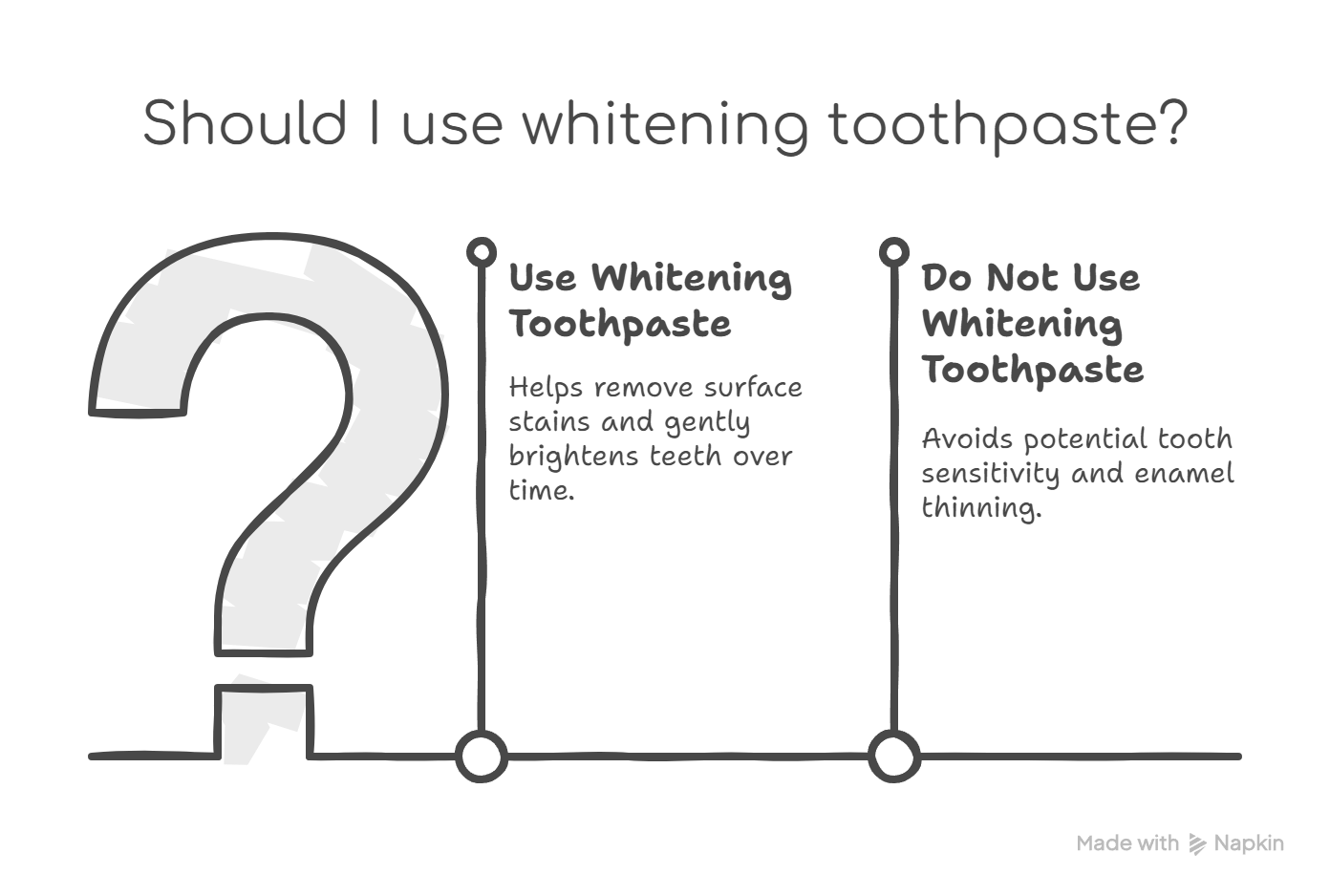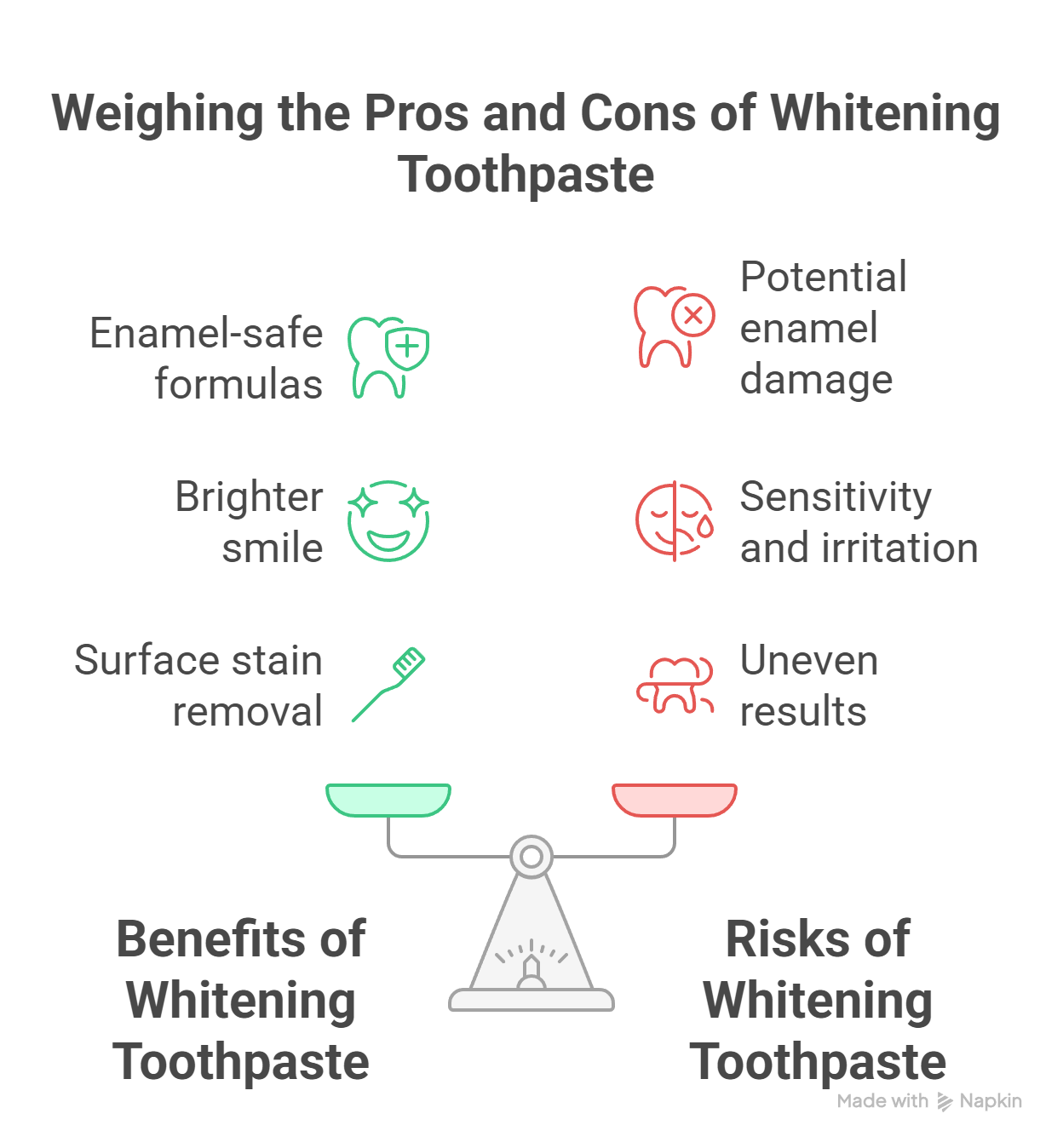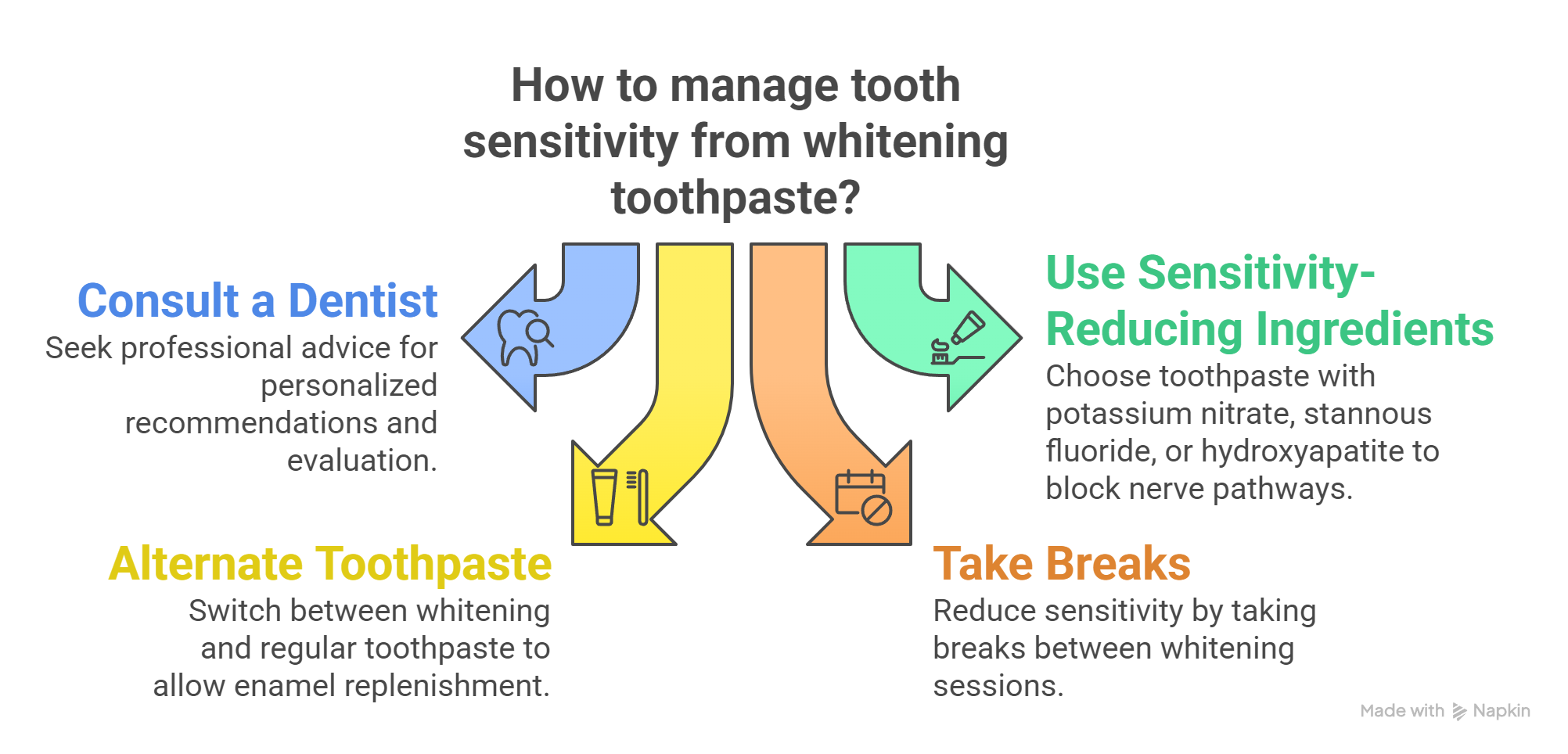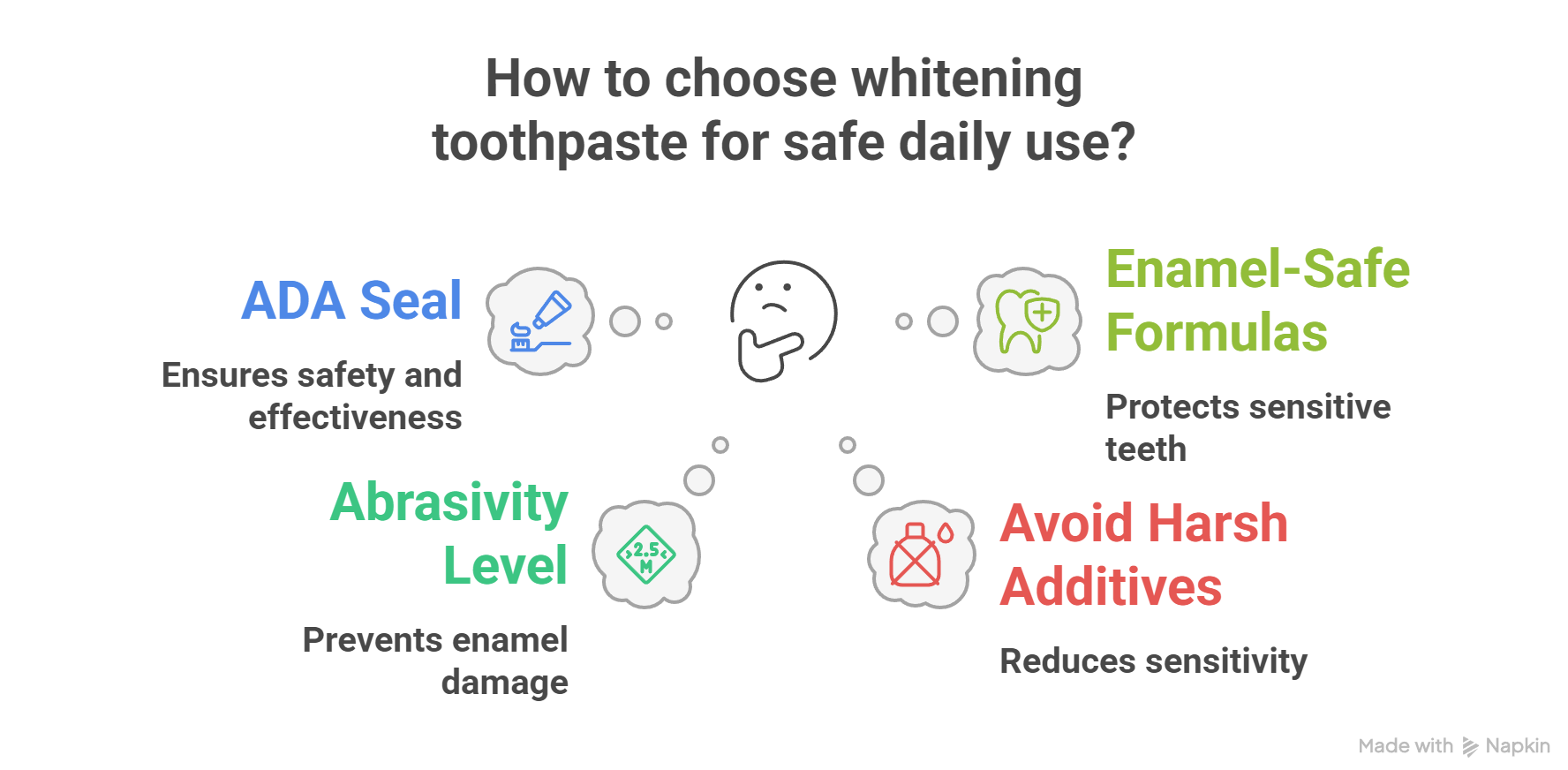Want a whiter smile without expensive treatments? You’re not alone.
But is it safe to use whitening toothpaste everyday? This common question matters, especially if you have sensitive teeth or are already using other brightening products.
While most teeth whitening toothpaste formulas are safe when used properly, ingredients like carbamide peroxide may cause irritation with overuse. In this guide, we’ll explore how to use whitening toothpaste safely, what to look for in a formula, and how to protect your enamel while still getting visible results.
Key Takeaways
-
Whitening toothpaste primarily removes surface stains and is generally safe for daily use when following ADA guidelines, but it may cause tooth sensitivity and enamel erosion if overused.
-
Choosing the right whitening toothpaste involves selecting products with low abrasivity and those that carry the ADA Seal of Acceptance to ensure safety and efficacy.
-
Regular dental check-ups and consulting with a professional are essential for individuals with existing dental issues or sensitivity when considering whitening treatments.
Shop SNOW Whitening Toothpaste
How Whitening Toothpaste Works and What You Should Know

Suppose you’ve ever wondered how whitening toothpaste works. The answer lies in its ability to remove surface stains and gently brighten your smile over time. While it won’t offer the dramatic results of professional whitening treatments, it can be a helpful part of your daily oral health routine.
Most whitening toothpaste formulas rely on:
-
Mild abrasives that polish away stains from coffee, wine, and food
-
Whitening agents like hydrogen peroxide or carbamide peroxide to gradually lighten the teeth
-
Other supportive ingredients that promote overall oral health
If you're new to what hydroxyapatite toothpaste is, it’s a fluoride-free option that mimics the natural minerals in your teeth, helping strengthen enamel while gently whitening.
These whitening agents are effective at lifting stains; however, the concentrations in over-the-counter toothpaste are significantly lower than those in professional treatments. That makes them safer for daily use and less likely to damage your tooth enamel.
Still, it’s important to understand that teeth whitening through toothpaste has limitations. Whitening toothpaste primarily targets surface stains rather than deep, intrinsic discoloration. For that reason, the results are more subtle compared to professional teeth whitening.
Also, overusing whitening toothpaste or choosing harsh formulas may lead to tooth sensitivity or thinning of tooth enamel over time. If you already have sensitive teeth, be cautious when selecting a formula and monitor how your teeth respond.
At SNOW, we’ve spent years developing a toothpaste that balances real whitening power with daily enamel protection. Our fluoride-free formula uses hydroxyapatite, a mineral clinically shown to rebuild enamel and reduce sensitivity, offering a safer, long-term approach to smile care.
Is it Safe to Use Whitening Toothpaste Daily?

Many people wonder if it is safe to use whitening toothpaste regularly. The short answer is yes. Daily use of whitening toothpaste is generally safe when you stick to American Dental Association (ADA)–accepted products and follow directions carefully. These formulas are made to be whitening toothpaste safe for regular use, helping you get brighter teeth without damaging enamel.
That said, no whitening product is risk-free. Some people may notice sensitivity, especially to cold foods, or mild gum irritation. If you experience discomfort, it is best to cut back, switch to a milder formula, or talk with your dentist about your oral health needs. While whitening toothpaste can improve your smile, using it too aggressively may cause whitening toothpaste damage enamel, reducing long-term dental health.
How to Use Whitening Toothpaste Safely
To keep your teeth healthy while still benefiting from whitening, it helps to be careful:
-
Choose formulas with gentle and avoid harsh bleaching agents, abrasive particles and lower peroxide levels to avoid toothpaste damage enamel.
-
Always follow the manufacturer’s instructions to prevent overuse and reduce the risk of damaging enamel.
-
Pair toothpaste with regular dental check ups so your dentist can monitor sensitivity, cavities, or worn enamel.
While whitening toothpaste can reduce surface stains, it cannot correct deeper intrinsic stains or match the results of professional whitening treatments. People with dental restorations like crowns or veneers may also notice uneven results, since these materials do not whiten the same way as natural enamel. In these cases, a dentist may recommend other whitening methods or professional teeth whitening for the best outcome.
At the end of the day, whitening toothpaste works best as part of a full routine. Daily brushing, flossing, and regular dental check ups, combined with professional guidance when needed, will keep teeth strong, support a healthier smile, and help you use whitening products safely. With the right balance of home care and exceptional dental care, you can enjoy the cosmetic benefits of whiter teeth without compromising long-term health.
Not all whitening toothpaste is created equal. SNOW’s Whitening Toothpaste is designed specifically for safe, everyday use. Its gentle abrasivity, combined with ingredients like CoQ10 and magnesium, supports oral tissue repair while gradually lifting stains, making it ideal for consistent, worry-free whitening.
Explore SNOW Oral Care Products
Potential Risks of Overusing Whitening Toothpaste
Whitening toothpaste every day can seem like an easy way to maintain a bright smile, but excessive use may harm your dental health. While these products are formulated to be safe when used as directed, daily or aggressive application, especially those with stronger whitening ingredients, can wear down natural teeth and irritate soft tissues over time.
Enamel Erosion and Tooth Sensitivity
Overusing whitening toothpaste daily may lead to tooth enamel erosion. As enamel thins, the dentin underneath becomes exposed, making healthy teeth more prone to tooth decay and hot or cold foods more uncomfortable. This is especially true of toothpaste formulations with harsh mild abrasives, hydrated silica, or higher levels of other whitening agents such as carbamide peroxide or hydrogen peroxide.
Some studies show that whitening toothpastes typically increase surface roughness and wear on both enamel and restorative materials. As enamel weakens, even high-quality teeth whitening products may not achieve the same results because they can’t reach or treat deeper stains effectively.
Gum Irritation and Soft Tissue Damage
Frequent use of daily whitening toothpaste doesn’t just affect enamel; it can irritate gums too. Over time, harsh whitening ingredients may inflame delicate tissue and lead to discomfort. Those with braces, aligners, or retainers should be cautious, as whitening pastes may also interact negatively with orthodontic appliances or dental work.
Impact on Dental Restorations and Whitening Systems
Excessive use of strong whitening formulas may affect dental restorations and cosmetic treatments. Restorative materials, veneers, and bonding agents can lose their luster or stability, potentially reducing their lifespan. Even add-on products like whitening strips, whitening pens, or whitening trays may not perform as expected on worn enamel, since they’re designed for intact, natural teeth.
Why Moderation Is Key
While whitening toothpaste every day can remove surface stains, relying on it exclusively can do more harm than good. It’s often better to alternate with a gentle fluoride-based paste or a non-abrasive formula containing baking soda to maintain results safely. This balanced approach preserves healthy teeth and supports long-term dental health without sacrificing your bright smile.
Managing Tooth Sensitivity

Excessive use of whitening toothpaste can lead to increased tooth sensitivity and gingival irritation. Some whitening agents’ acidity can attack enamel crystals, leading to damaging enamel and surface demineralization. This can make your teeth more sensitive to hot or cold foods and drinks, causing significant discomfort. Many people with sensitive teeth wonder if alternatives like hydroxyapatite toothpaste are safe, especially for long-term, daily use.
Sensitivity typically resolves as minerals in the enamel are replenished. Alternating whitening toothpaste with regular toothpaste can help manage sensitivity. Ingredients in toothpaste that can help reduce sensitivity include:
-
Potassium nitrate
-
Stannous fluoride
-
Hydroxyapatite These ingredients help to block the pathways to the nerves in your teeth, providing relief from sensitivity.
Taking breaks between whitening sessions can reduce the risk of heightened sensitivity. If you experience persistent sensitivity from whitening toothpaste, consider the following steps:
-
Consult a dental professional for further evaluation.
-
Obtain personalized advice.
-
Get recommendations for products designed to manage sensitivity and offer whitening benefits.
Many whitening toothpastes use strong peroxides that can trigger sensitivity. SNOW uses a dual-action system with hydrogen peroxide for stain removal and nano-hydroxyapatite to remineralize enamel, helping reduce pain from exposed dentin while still delivering visible whitening results.
How to Choose Whitening Toothpaste for Safe Daily Use

Choosing the right whitening toothpaste for everyday use means balancing whitening power with long-term oral protection. Follow these simple tips to pick a formula that works for your smile — without compromising your tooth enamel or comfort.
1. Look for the ADA Seal
Start with a toothpaste that has the American Dental Association (ADA) Seal of Acceptance. This confirms the product contains fluoride toothpaste and meets standards for cavity prevention, safety, and effectiveness.
If you're considering fluoride-free options, it's helpful to understand the differences between hydroxyapatite vs fluoride and how each supports enamel and overall oral health.
2. Check the Abrasivity Level
Whitening toothpastes typically rely on mild abrasives to polish away surface stains, but overly abrasive formulas can stain teeth or damage enamel. Choose one with a Relative Dentin Abrasivity (RDA) score under 250, ideally below 200, for safer daily use.
3. Avoid Harsh Bleaching Additives
Watch out for excessive bleaching ingredients like hydrogen peroxide unless clearly marked for daily use. These may whiten quickly but can also trigger tooth sensitivity and wear down your enamel if overused.
4. Choose Enamel-Safe and Sensitivity-Friendly Formulas
If you have sensitive teeth, go with a whitening toothpaste that supports comfort while helping you achieve a bright smile. Look for ingredients that soothe and strengthen.
SNOW’s Whitening Toothpaste is formulated to gently lift stains while protecting enamel, making it a smart choice for safe, everyday whitening. It’s sensitivity-friendly, fluoride-powered, and made to help you maintain a radiant smile, without compromise.
Best Practices for Using Whitening Toothpaste
To help prevent damage enamel and maintain oral health:
-
Use a soft-bristle toothbrush.
-
Apply gentle pressure while brushing.
-
Brush for at least two minutes twice daily.
-
Use whitening toothpaste to promote whitening.
Adhering to the directions on the label ensures effective and safe results. Following these best practices can help you achieve a brighter smile and a healthy smile without compromising your dental health while receiving exceptional dental care for brighter teeth, leading to a healthier smile and healthy teeth.
Special Considerations for Different Users
Individuals with sensitive teeth may experience increased discomfort when using whitening agents. Applying whitening toothpaste on exposed tooth roots can cause irritation and discomfort. Children and adolescents should avoid whitening toothpastes because of their developing teeth.
Those with existing dental restorations like crowns or fillings should avoid whitening toothpaste, as whitening toothpaste bad can lead to high concentrations of peroxide linked to a greater risk of tooth erosion and degradation of dental restorations. Orthodontic patients may achieve uneven whitening results, as only the areas of teeth exposed during treatment will lighten.
Patients with gum disease should opt for therapeutic toothpastes recommended by their dentist instead of whitening varieties. Some individuals may experience allergic reactions to ingredients found in whitening toothpaste.
When to Consult a Dental Professional
If you're unsure which toothpaste formulations are best, talk to your dental professional, especially if you’re already using whitening products like strips, pens, or trays.
Seek dental advice in the following situations:
-
If sensitivity persists after using whitening toothpaste.
-
If whitening toothpaste causes prolonged discomfort or pain.
-
If experiencing adverse reactions like gum irritation.
Recommendations for whitening regimen and dental care:
-
Seek professional advice from dental professionals before starting any whitening regimen if you have dental restorations.
-
Regular dental check-ups ensure any whitening treatment is appropriate for your dental condition and can support preventive dentistry.
-
Regular dental visits can help detect any potential issues from using whitening toothpaste to whiten teeth.
Final Thoughts
Whitening toothpaste can be a powerful tool for maintaining a bright smile, as long as it's used correctly. With the right product and consistent oral care habits, you can enjoy visible results without compromising tooth enamel or triggering tooth sensitivity.
Stick to gentle, enamel-safe formulas, follow usage guidelines, and don’t forget to consult your dentist if you're unsure what's best for your oral health needs.
For a daily option that’s both effective and kind to your teeth, SNOW Whitening Toothpaste offers clinically tested, sensitivity-friendly support for your routine.
Shop the Whitening Toothpaste Now
Frequently Asked Questions
Here are clear answers to the most common concerns about keeping your smile healthy and bright.
Is it safe to use whitening toothpaste every day?
It is generally safe to use whitening toothpaste every day, provided it has the ADA Seal of Acceptance and meets safety criteria for abrasivity. Always check the product specifications to ensure it aligns with your dental needs.
What should I do if I experience tooth sensitivity from whitening toothpaste?
If you experience tooth sensitivity from whitening toothpaste, reduce how often you use it and consider alternating with a desensitizing toothpaste. If the sensitivity continues, it's advisable to consult a dental professional.
Can children use whitening toothpaste?
Children should not use whitening toothpaste as it can affect their developing teeth; it's best to consult a dentist for suitable alternatives.
Will whitening toothpaste affect my dental restorations?
Whitening toothpaste will not affect the color of your dental restorations, such as crowns or veneers. For personalized guidance, it's best to consult your dentist.
How can I choose the best whitening toothpaste for my needs?
To choose the best whitening toothpaste, prioritize products with the ADA Seal of Acceptance and a low RDA score, and consult your dentist for personalized recommendations. This ensures you select a toothpaste that is effective and safe for your oral health.

































































![Is It Safe to Use Whitening Toothpaste Everyday? [The Real Answer]](http://snow-teeth-whitening.myshopify.com/cdn/shop/articles/is_it_safe_to_use_whitening_toothpaste_everyday.png?v=1759931228)


